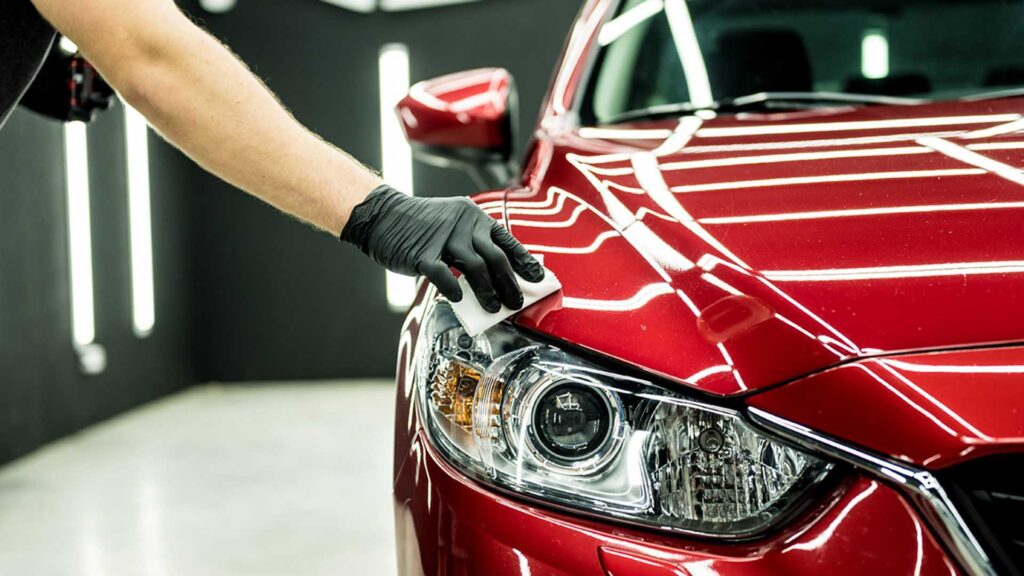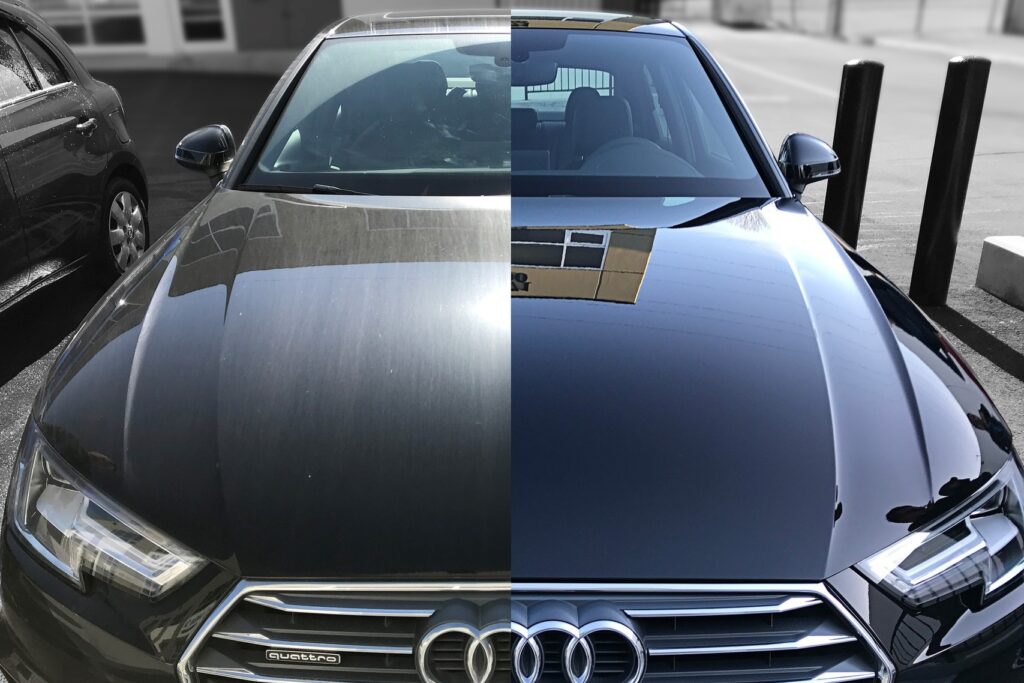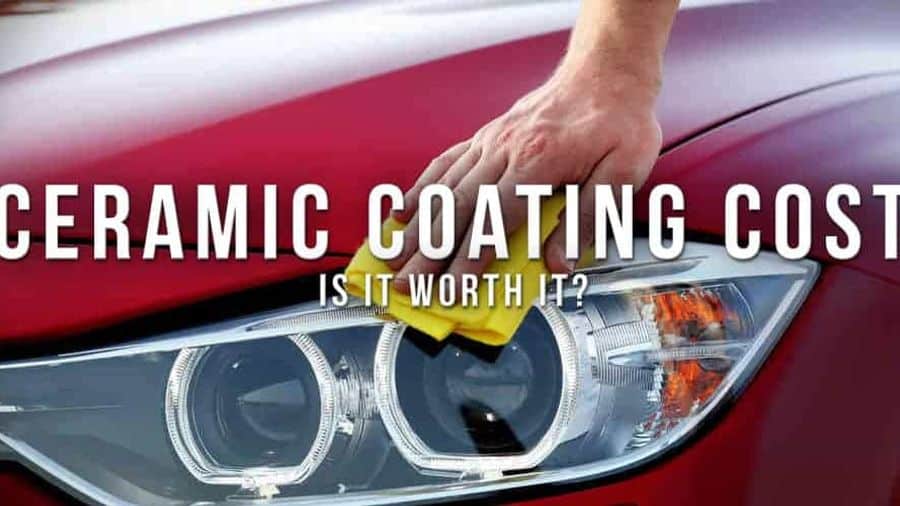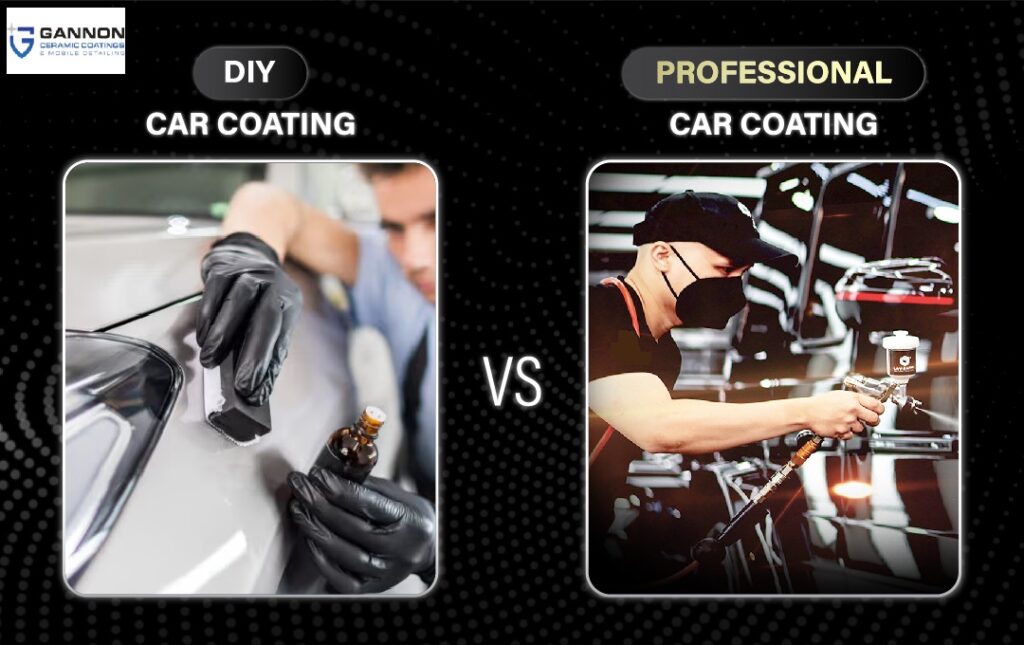In the world of automotive care and protection, ceramic coating has emerged as a revolutionary solution for preserving your vehicle’s appearance and value. As Arizona’s leading vehicle detailing company since 2001, Gannon Ceramic Coatings & Mobile Detailing has witnessed firsthand how this advanced technology has transformed the way car enthusiasts and everyday drivers protect their investments. This comprehensive guide will walk you through everything you need to know about ceramic coatings – from what they are and how they work to their benefits, application process, longevity, and cost considerations.
What is Ceramic Coating for Cars?

Understanding Ceramic Coating Technology
Ceramic coating is a liquid polymer solution that chemically bonds with your vehicle’s factory paint, creating a permanent or semi-permanent protective layer. Unlike traditional waxes or sealants that sit on top of the paint, ceramic coatings use nanotechnology to form a microscopic layer of protection that integrates with the paint surface at a molecular level.
The primary component in most ceramic coatings is silicon dioxide (SiO₂), derived from quartz crystals or silica. When applied to a vehicle’s surface, this substance creates an incredibly strong, durable shield that can withstand extreme conditions. The higher the SiO₂ percentage in a coating formula, the stronger and more durable the protection it provides.
Professional-grade ceramic coatings, like those used by Gannon Detailing, typically contain higher concentrations of these protective compounds compared to consumer-grade products, resulting in superior longevity and performance.
How Ceramic Coating Differs From Traditional Wax

While both ceramic coatings and traditional car waxes aim to protect your vehicle’s paint, they differ significantly in their composition, application method, durability, and protective qualities:
Composition: Traditional car waxes are usually made from carnauba wax (derived from palm leaves) or synthetic polymers. Ceramic coatings, by contrast, utilize silicon dioxide and other ceramic compounds that create much stronger chemical bonds.
Application: Wax is relatively simple to apply and remove. Ceramic coatings require meticulous surface preparation, controlled application environments, and specific curing processes – making professional application highly recommended.
Durability: A quality wax job might last 1-3 months before needing reapplication. Professional ceramic coatings can last anywhere from 1 year to 8+ years, depending on the formula used and maintenance practices.
Protection Level: Wax provides basic protection against light contaminants and minor UV exposure. Ceramic coatings deliver superior protection against UV rays, chemical stains, oxidation, water spots, and environmental contaminants.
Appearance: Both products enhance a vehicle’s shine, but ceramic coatings typically provide a deeper, more reflective finish with enhanced color depth that lasts significantly longer.
Key Benefits of Ceramic Coating for Cars
Long-Lasting Protection & Durability
Perhaps the most significant advantage of ceramic coating is its exceptional durability. Unlike waxes that break down within weeks or months, professional ceramic coatings can protect your vehicle for years. At Gannon Detailing, we offer various protection packages ranging from 1-year solutions to premium coatings that last 8+ years.
This longevity stems from the coating’s ability to withstand exposure to environmental contaminants, harsh weather conditions, and regular washing without degrading. For drivers in Arizona, where extreme heat and intense sun exposure can rapidly deteriorate traditional protectants, this durability is particularly valuable.
Enhanced Shine and Gloss
Ceramic coatings significantly enhance your vehicle’s appearance by creating an exceptionally smooth surface that reflects light more effectively. This results in a showroom-quality shine with remarkable depth and clarity that makes colors appear richer and more vibrant.
The hydrophobic properties of ceramic coatings also contribute to this enhanced appearance. Water beads up and rolls off quickly, taking surface contaminants with it and maintaining a cleaner, more reflective finish between washes.
UV Protection and Oxidation Prevention
The harsh Arizona sun can wreak havoc on automotive paint through UV damage. Prolonged exposure leads to oxidation, causing your vehicle’s paint to fade, develop a chalky appearance, or even crack over time.
Ceramic coatings act as a powerful UV inhibitor, preventing solar radiation from penetrating the paint surface. This protection significantly slows the oxidation process, helping maintain your vehicle’s vibrant color and finish for years rather than months.
Resistance to Dirt, Water, and Chemical Stains
One of the most impressive features of ceramic coatings is their hydrophobic (water-repelling) and oleophobic (oil-repelling) properties. These characteristics make the coated surface extremely resistant to water spots, dirt accumulation, bird droppings, tree sap, road grime, and other contaminants.
When liquid touches a ceramic-coated surface, it beads up and rolls off instead of spreading and potentially causing stains. This makes maintenance significantly easier, as contaminants can’t bond as readily to the protected surface. For many vehicle owners, this “self-cleaning” effect alone justifies the investment in ceramic coating.
Additionally, the coating offers excellent chemical resistance, protecting against damage from acid rain, harsh detergents, and environmental pollutants that can etch into unprotected paint surfaces.
Step-by-Step Ceramic Coating Application Process
Pre-Application: Surface Preparation & Paint Correction
The success of a ceramic coating application depends heavily on proper surface preparation. Professional detailers like those at Gannon follow a rigorous multi-step process:
-
Thorough washing: The vehicle is comprehensively cleaned to remove surface contaminants.
-
Clay bar treatment: This step removes embedded contaminants that washing alone cannot eliminate.
-
Paint decontamination: Chemical decontaminants are used to remove industrial fallout, rail dust, and other bonded particles.
-
Paint correction: Perhaps the most critical step, this involves machine polishing to remove swirl marks, scratches, water spots, and other imperfections. Since ceramic coating will lock in the current condition of your paint, correcting flaws beforehand is essential.
-
Panel wipe: A special solution removes any remaining polishing oils or residues, creating a perfectly clean surface for bonding.
This preparation stage typically accounts for 80-90% of the total time investment in a professional ceramic coating service. At Gannon Detailing, we emphasize this stage because even the finest ceramic coating cannot compensate for poor surface preparation.
Applying the Ceramic Coating
Once the vehicle’s surface is properly prepared, the ceramic coating application begins:
-
Controlled environment: Professional applications are performed in controlled environments to prevent dust or contaminants from affecting the result.
-
Sectional application: The coating is applied one section at a time using specific applicators. Typically, installers work in 2×2 foot sections.
-
Flash time: The coating is allowed to “flash” (begin curing) for a specific amount of time according to the manufacturer’s instructions.
-
Leveling and removal: Any excess product is carefully removed to ensure an even application.
-
Inspection: Using specialized lighting, technicians inspect for high spots or uneven application that could affect the final appearance.
Curing and Post-Coating Maintenance
After application, ceramic coatings require a curing period to fully bond with the paint surface:
-
Initial curing: Most coatings need 24-48 hours protected from water and contaminants.
-
Complete curing: Full chemical bonding typically takes 1-2 weeks, during which special care is recommended.
-
Post-cure inspection: At Gannon Detailing, we conduct a final inspection after the initial curing period to ensure perfect application.
For ongoing maintenance, ceramic-coated vehicles benefit from:
- Regular washing with pH-neutral car wash soaps
- Avoiding automatic car washes with abrasive brushes
- Periodic application of ceramic coating boosters or maintenance sprays
- Prompt cleaning of bird droppings, tree sap, or other harmful contaminants
How Long Does Ceramic Coating Last on Cars?
The longevity of ceramic coatings varies based on several factors:
Coating Quality: Professional-grade coatings generally last significantly longer than consumer DIY products. At Gannon Detailing, we offer various protection packages ranging from 1-year to 8+ years.
Application Process: Properly applied coatings by certified professionals will consistently outlast DIY applications due to optimal surface preparation and controlled application conditions.
Maintenance Practices: Regular maintenance with appropriate products can substantially extend coating life. Harsh chemicals, improper washing techniques, and automated car washes with abrasive brushes can significantly reduce longevity.
Environmental Exposure: Vehicles kept in garages and protected from extreme elements typically maintain their coating longer than those constantly exposed to harsh conditions. In Arizona’s climate, additional protection from intense sun exposure is particularly beneficial.
Driving Conditions: Frequent driving on gravel roads, in industrial areas, or in regions with road salt will challenge even the best ceramic coatings more than highway driving in clean environments.
With proper care and maintenance, a professional ceramic coating from Gannon Detailing can protect your vehicle for many years, representing an excellent long-term investment in your vehicle’s appearance and value.
Cost of Ceramic Coating for Cars

Factors Affecting Ceramic Coating Pricing
Professional ceramic coating services vary in price based on several factors:
Vehicle Size and Condition: Larger vehicles require more product and labor time. Vehicles in poor condition needing extensive paint correction will incur higher costs.
Coating Quality: Higher-grade coatings with greater durability and performance generally command premium prices. At Gannon Detailing, we offer various ceramic coating packages to accommodate different protection needs and budgets.
Preparation Requirements: Vehicles needing significant paint correction or decontamination will require more labor, affecting the overall price.
Additional Services: Many owners opt for complementary services like headlight restoration, wheel coating, glass coating, or interior protection alongside their ceramic coating application.
Geographic Location: Pricing varies significantly by region based on local market conditions, cost of living, and competition.
Professional vs. DIY Ceramic Coating Costs
Professional Application: For a sedan-sized vehicle, professional ceramic coating typically ranges from $800 to $2,000+ depending on the factors above. Premium multi-layer systems with 5+ years of durability can exceed $2,500. However, this investment amortized over the coating’s lifespan often proves cost-effective compared to traditional protection methods requiring frequent reapplication.
DIY Kits: Consumer-grade ceramic coating kits range from $50 to $200, appearing significantly less expensive than professional services. However, these products generally contain lower concentrations of protective compounds and lack the durability of professional coatings. Additionally, without proper application equipment, controlled environments, and professional techniques, results typically fall short of professional applications.
Professional Ceramic Coating vs. DIY Kits

Advantages of Professional Application
Superior Preparation: Professionals like those at Gannon Detailing have the tools, products, and expertise to properly prepare surfaces, including paint correction that DIY enthusiasts typically cannot match.
Better Products: Professional-only coatings contain higher concentrations of protective compounds and are generally unavailable to consumers.
Controlled Environment: Proper application requires dust-free, temperature-controlled environments that most home garages cannot provide.
Expertise and Equipment: Certified installers understand the nuances of different coating systems and have specialized equipment for optimal application.
Warranty Protection: Many professional applications come with warranties that guarantee performance for a specified period, providing peace of mind that DIY applications cannot offer.
Pros and Cons of DIY Ceramic Coating
Pros:
- Significantly lower initial cost
- Flexibility to apply on your own schedule
- Satisfaction of completing the project yourself
- No need to leave your vehicle with a service provider
Cons:
- Limited access to professional-grade products
- Lack of specialized equipment for proper surface preparation
- Challenges in maintaining an ideal application environment
- Significantly shorter lifespan compared to professional applications
- No warranty protection
- Risk of application errors that could require professional correction
For most vehicle owners, professional ceramic coating application provides superior results and better long-term value despite the higher initial investment.
Frequently Asked Questions about Ceramic Coating for Cars
Q: Will ceramic coating prevent scratches?
A: Ceramic coatings provide some resistance against light scratches and swirl marks, but they are not scratch-proof. They create a sacrificial layer that takes minor damage instead of your paint, but significant impacts will still affect the coating and potentially the paint beneath.
Q: Does ceramic coating eliminate the need to wash my car?
A: No, ceramic coatings make maintenance easier but don’t eliminate the need for regular washing. Their hydrophobic properties help prevent dirt and contaminants from bonding to the surface, making washing easier and less frequent, but regular maintenance is still necessary.
Q: Can ceramic coating be applied to older vehicles?
A: Yes, but older vehicles often require more extensive paint correction before coating application. The coating will enhance and preserve the vehicle’s appearance after proper preparation, but it cannot remedy deep scratches or severe oxidation without prior correction.
Q: Is ceramic coating suitable for matte finishes?
A: Special ceramic coatings formulated specifically for matte finishes are available. These provide protection without adding gloss that would alter the matte appearance. Standard ceramic coatings should never be used on matte finishes.
Q: Can ceramic coating be removed?
A: Yes, but removal typically requires machine polishing that removes a small amount of clear coat. This should be performed by professionals to avoid damaging the paint.
Q: How soon after getting a new car should I apply ceramic coating?
A: Ideally, ceramic coating should be applied as soon as possible on new vehicles, before the paint has a chance to sustain damage. Even brand new vehicles benefit from light paint correction before coating application to address dealer-installed swirl marks and imperfections.
Conclusion: Is Ceramic Coating Worth It for Your Car?
Ceramic coating represents a significant advancement in vehicle protection technology, offering durability and performance that far exceeds traditional methods. For most vehicle owners, particularly those in harsh climates like Arizona’s extreme heat and sun exposure, ceramic coating delivers exceptional value despite its higher initial cost.
When professionally applied by experienced technicians like those at Gannon Ceramic Coatings & Mobile Detailing, ceramic coatings provide years of protection while maintaining your vehicle’s showroom appearance with minimal maintenance. The reduced need for frequent waxing or polishing, combined with easier cleaning and superior protection against environmental damage, makes ceramic coating a wise investment for preserving your vehicle’s appearance and resale value.
However, the decision ultimately depends on several factors, including:
- How long you plan to keep your vehicle
- Your budget for vehicle appearance maintenance
- The environmental conditions your vehicle faces
- Your dedication to vehicle appearance and protection
- Whether you prefer DIY maintenance or professional services
For those who value long-term protection, easier maintenance, and superior appearance, professionally applied ceramic coating offers compelling advantages that justify the investment. With options ranging from 1-year to 8+ year protection packages, Gannon Detailing provides solutions tailored to diverse needs and budgets, helping vehicle owners throughout the Phoenix metro area protect their automotive investments against Arizona’s challenging climate.
Whether you drive a daily commuter, weekend sports car, luxury vehicle, or hardworking truck, ceramic coating technology offers unprecedented protection that keeps your vehicle looking its best for years to come.
